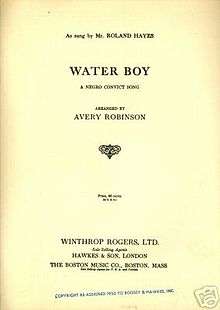Avery Robinson
Avery Robinson (January 21, 1878 – May 11, 1965 [1]) was an American classical composer who worked with, among others, Roland Hayes and Paul Robeson.

Biography
Avery Robinson was born on January 21, 1878 in Louisville, Kentucky.[2] His father was a local mill owner there. After graduating from MIT, Avery returned to Louisville to work for his father and for another mill owner, W. E. Chess.[3] In 1907 he married Chess's daughter Mary, who would later found the Mary Chess Company, a perfume manufacturer. In 1909 their daughter Carley was born.
In 1920 Robinson left Louisville for London where he was employed as treasurer to the Royal Philharmonic Society. While there his daughter attended the newly founded Montessori School, and later studied musical composition with Nadia Boulanger.[4]
After returning to the United States Avery was employed by the Mary Chess Company. Avery Robinson died in Pittsfield, Mass. on May 11, 1965.[5]
Works
Pieces composed by (or in part by) Robinson include:
References
- Presto Classical, Avery Robinson page Retrieved July 15, 2007
- ASCAP Biographical Dictionary of Composers, Authors and Publishers, 3rd. ed. New York: ASCAP, 1966.
- Schmidtt, Martin (2004). "Catalog of Manuscripts in the University of Oregon Library" (PDF). [908] Robinson, Avery, 1878-1965. University of Oregon. Archived from the original (PDF) on 2012-06-17. Retrieved 2009-11-12.
- Rosenstiel, Léonie (1998). Nadia Boulanger: A Life in Music. New York: W. W. Norton & Company. p. 209. ISBN 0-393-31713-7. Retrieved 2009-11-12.
- "Avery Robinson, Song Writer Known for 'Water Boy,' Dies". The New York Times. New York. 1965-05-13. p. 37. Retrieved 2009-11-12.
- Amazon.de, Belafonte Returns to Carnegie Hall, retrieved July 15, 2007